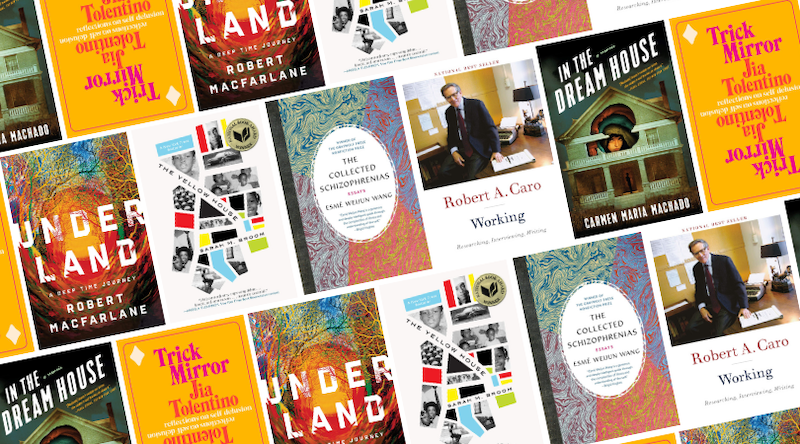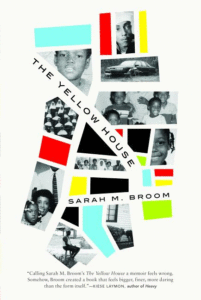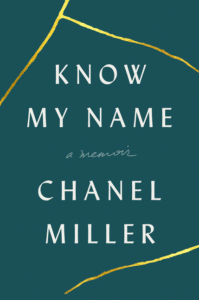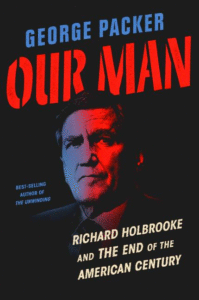
We’ve come to the end of another year in reading, folks, and as stewards of this venerable repository of literary criticism, it is once again our sacred duty to dust off the abacuses (abaci?) and tabulate the best reviewed books of past twelve months.
Yes, using reviews drawn from more than 150 publications, over the last two weeks we’ve been revealing the most critically-acclaimed books of 2019, in the categories of (deep breath): Memoir & Biography, Poetry, Sci-Fi & Fantasy, Essay Collections, Graphic Literature, Literature in Translation, Short Story Collections, Mystery & Crime, Nonfiction, and Fiction.
Now, for our penultimate roundup of the year, we turn to Nonfiction.
1. In the Dream House by Carmen Maria Machado
25 Rave • 11 Positive
“The book itself takes a breathtakingly inventive form … This elaborate architecture could have felt florid, but the headings also help unlock each vignette’s function, like a brushstroke guiding viewers’ eyes around a painting … These shifting angles of illumination achieve a full, strange representation of the subject … Machado’s writing, with its heat and precise command of tone, has always had a sentient quality. But what makes In the Dream House a particularly self-aware structure—which is to say, a true haunted house—is the intimation that it is critiquing itself in real time. Machado seems to anticipate—and even riff on—our skepticism of her tricks … Some of Machado’s preëmptive maneuvers work better than others … Machado understands that memoir, like architecture, requires a sense of proportion. The problem is that women’s feelings are rarely ever considered proportional … Machado understands that memoir, like architecture, requires a sense of proportion. The problem is that women’s feelings are rarely ever considered proportional … Here and in her short stories, Machado subjects the contemporary world to the logic of dreaming. She is often said to spin urban legends or fairy tales; her writing, while clear, is full of nameless currents, hidden transactions between pleasure and terror. The result is a space that cannot, even years later, be easily escaped.”
–Katy Waldman (The New Yorker)
2. Underland: A Deep Time Journey by Robert Macfarlane
26 Rave • 7 Positive • 2 Mixed
“You know a book has entered your bloodstream when the ground beneath your feet, once viewed as bedrock, suddenly becomes a roof to unknown worlds below … If writing books is a form of making maps to guide us through new intellectual territory, Macfarlane is a cartographer of the first order … Macfarlane’s writing is muscular, meticulously researched and lyrical, placing him in the lineage of Peter Matthiessen, Gretel Ehrlich and Barry Lopez. What distinguishes his work is his beginner’s mind, his lack of self-consciousness, his physical pursuit of unlearning what he has been taught by received information … Underland is a book of dares. Macfarlane dares to go deep into earth’s unseen world and illuminate what we not only shy away from but what we don’t even know exists … Underland is a portal of light in dark times. I needed this book of beauty below to balance the pain we’re witnessing aboveground.”
–Terry Tempest Williams (The New York Times Book Review)
3. Trick Mirror: Reflections on Self-Delusion by Jia Tolentino
19 Rave • 16 Positive
“…announces a major talent in the art of the essay … In an essay titled ‘Always Be Optimizing,’ Tolentino looks at ‘the ideal woman,’ the one you see posting about her workouts, children, and garden on Instagram … Tolentino isn’t mocking such women—she writes (often hilariously) about her own experiences in yoga and barre class and wolfing down yet another chopped salad. What makes the essay more than simple cultural observation is Tolentino’s critique of the economic and societal forces that twist women into such an unsustainable set of contradictions … Pessimism about false promises might turn out to be the cultural legacy of Tolentino’s generation, the much-maligned millennials. The best essays in the collection aim directly at these outrages—the few that stray from it tend to work less well … If anything can save us, it just might be the snap of Tolentino’s humor, the eloquence of her skepticism.”
–Kate Tuttle (The Boston Globe)

4. The Yellow House by Sarah M. Broom
16 Rave • 10 Positive
“…[an] extraordinary, engrossing debut … Broom…pushes past the baseline expectations of memoir as a genre to create an entertaining and inventive amalgamation of literary forms. Part oral history, part urban history, part celebration of a bygone way of life, The Yellow House is a full indictment of the greed, discrimination, indifference and poor city planning that led her family’s home to be wiped off the map. It is an instantly essential text, examining the past, present and possible future of the city of New Orleans, and of America writ large … Broom is our guide, but not the sort who holds readers’ hands, uninterested as she is in tidy transitions between one type of writing and another. The through line is her thought process, her frequent questioning … The interviews also yield unforgettable scenes … The true test of her worthiness is her empathy and focused attention. She is a responsible historian, granting her subjects the grace of multiple examinations over the years … Broom’s deadpan humor comes through clearest in her descriptions of herself … The Yellow House is a book that triumphs much as a jazz parade does: by coming loose when necessary, its parts sashaying independently down the street, but righting itself just in the nick of time, and teaching you a new way of enjoying it in the process.”
–Angela Flournoy (The New York Times Book Review)
5. The Collected Schizophrenias by Esmé Weijun Wang
15 Rave • 9 Positive • 1 Mixed
“Esmé Weijun Wang’s new book of essays… warrants much of the hype and anticipation surrounding it … Wang is a highly articulate and graceful essayist, and her insights, in both the clinical and general senses, are exceptional … [Wang’s] perspective in The Collected Schizophreniasis encyclopedic and prismatic even without taking into account how her primary mental illness may have fractured her identity … [Wang] writes with clarity about how it feels when a psychotic episode descends upon her, an experience only a fraction of us will ever have … These essays are mesmerizing and at times bittersweet … The Collected Schizophrenias is a necessary addition to a relatively small body of literature, but it’s also, quite simply, a pleasure to read. The prose is so beautiful, and the recollection and description so vivid, that even if it were not mostly about an under-examined condition it would be easy to recommend.”
–Katharine Coldiron (The Los Angeles Review of Books)
6. Furious Hours: Murder, Fraud, and the Last Trial of Harper Lee by Casey Cep
12 Rave • 11 Positive • 4 Mixed
“Casey Cep has picked up where Lee left off: She’s written the true-crime story that Harper Lee never figured out how to write … It’s one measure of just how rich Casey Cep’s material is, and how artfully she handles it, that I have given away only about a tenth of the interest and delight contained within just the first third or so of her book. She reminded me all over again how much of good storytelling is leading the reader to want to know the things you are about to tell him, while still leaving him to feel that his interest was all his idea. By the time I got to the section on Harper Lee, I wanted to know more about her than I’ve ever thought I wanted to know … Furious Hours builds and builds until it collides with the writer who saw the power of Maxwell’s story, but for some reason was unable to harness it. It lays bare the inner life of a woman who had a world-class gift for hiding … it’s in her descriptions of another writer’s failure to write, that [Cep’s] book makes a magical little leap, and it goes from being a superbly written true-crime story to the sort of story that even Lee would have been proud to write.”
–Michael Lewis (The New York Times Book Review)
7. Working by Robert A. Caro
8 Rave • 18 Positive • 1 Mixed
“… a slim volume, but when readers come to the end, they might wish it had gone on as long as the colossal masterworks for which the historian is celebrated … delightful … While stories of Caro’s investigative achievements are astonishing, the nuts-and-bolts details of his research and writing process are charming … The humility, the tenacity, the ardent desire to make his readers truly understand a subject, the decades spent taking care to produce something masterful and meaningful—all of it stands in stark contrast to the more punishing aspects of our information cycle. We might not deserve Robert Caro, but we’re certainly lucky to have him.”
–Barbara Spindel (The Barnes & Noble Review)

8. Know My Name by Chanel Miller
16 Rave • 3 Positive
“… the product of rigorous writerly attention … If Know My Name had been shaped in these slicker forms—a corrective, a tell-all—readers sympathetic to Miller would have readily received her rage, whatever her tone. But Miller situates victimhood as a conduit to expertise, and trauma as a mode of human insight … Miller is a gifted storyteller who establishes her authority by stacking details, setting scenes … she observes her own ordeal by adopting the stance of a reporter, a media critic, and an activism-minded theorist. She is heartbreakingly resourceful, marshalling her subjectivity as evidence of a system set up to protect the potential of a boy like Turner … contains a forceful critique of the complicity of liberal institutions like Stanford, which seem more afraid of upsetting sensibilities than they are concerned with doing right by survivors like Miller … Miller’s writing début may have been precipitated by her assault, but the final work devitalizes its horrific beginnings. No narrative is as persuasive as Miller’s. There is no more self-effacing sobriety, no more conclusions plastering confusion and fury. Know her name, know her voice.”
–Doreen St. Félix (The New Yorker)
9. Coventry by Rachel Cusk
11 Rave • 10 Positive • 4 Mixed
“…a sharp new miscellany … Cusk’s first collection of essays. It also contains some book reviews and introductions, but her heart does not seem in them. She mediates between her mind and the external world with a precision and agility that mostly goes missing when she mediates between texts … [the essays] are first-rate, marked by candor and seriousness, and they’re familiar … Her writing about parenting is discerning and granular … Cusk’s essays are subtle; they do not announce their intentions through a megaphone. She feels her way into her topics and she will not be hurried. You read her for her riddling questions, not whatever answers might pop out at the end. She is often ambivalent, but never neutral in the self-protective modern manner. She is a poet of split feelings. Her inquisitive intelligence is the rebar that, inside the concrete, holds the edifice upright.”
–Dwight Garner (The New York Times)

10. Our Man: Richard Holbroke and the End of the American Century by George Packer
15 Rave • 4 Positive • 3 Mixed • 1 Pan
“I doubt that any novel, not even one co-written by Graham Greene and F. Scott Fitzgerald, could have captured Holbrooke fully, and I certainly thought that no biography ever would. But now one has. George Packer’s Our Man portrays Holbrooke in all of his endearing and exasperating self-willed glory: relentless, ambitious, voracious, brilliant, idealistic, noble, needy and containing multitudes. It’s both a sweeping diplomatic history and a Shakespearean tragicomedy, with Holbrooke strutting and fretting his hour on the stage … the book overflows with the trait that was Holbrooke’s saving grace: an in-your-face intellectual honesty that is not tainted, as Holbrooke’s was, by his manipulativeness. The result is so bracing that Our Man not only revitalizes but in some ways reinvents the art of journalistic biography.”
–Walter Isaacson (The New York Times Book Review)
*
Our System: RAVE = 5 points • POSITIVE = 3 points • MIXED = 1 point • PAN = -5 points

